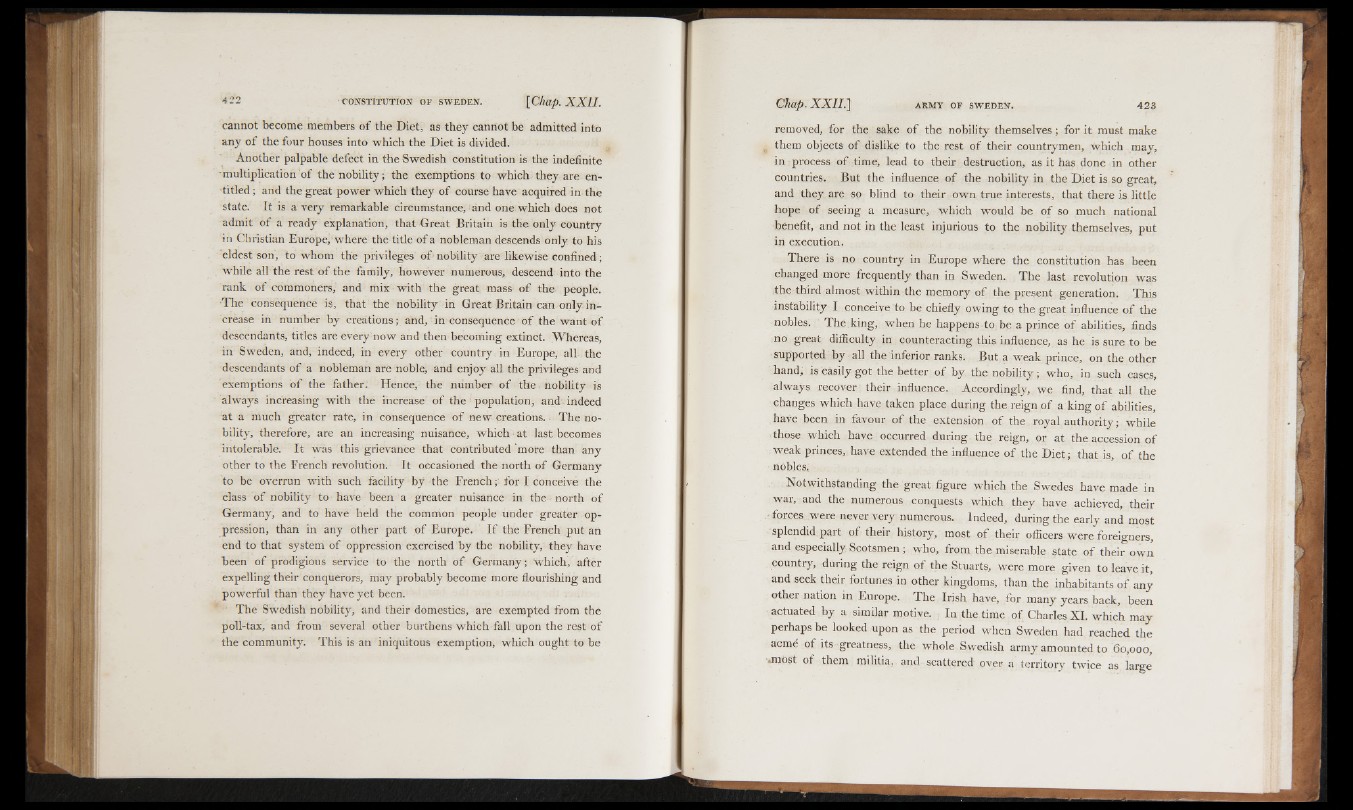
cannot become members o f the Diet, as they cannot be admitted into
any o f the four houses into which the Diet is divided.
Another palpable defect in the Swedish constitution is the indefinite
'multiplication of the nobility; the exemptions to which they are entitled
; and the great power which they of course have acquired in the
state. It is a very remarkable circumstance, and one which does not
admit of a ready explanation, that Great Britain is the only country
in Christian Europe, where the title of a nobleman descends only to his
eldest son, to whom the privileges o f■ nobility are likewise confined;
while all the rest of the family, however numerous, descend into the
rank o f commoners,' and mix with the great mass o f the people.
■The consequence is, that the nobility in Great Britain can only increase
in number by creations; and, in consequence o f the want of
descendants, titles are every now and then becoming extinct. Whereas,
in Sweden, and, indeed, in every other country, in Europe, all the
descendants of a nobleman are noble, and enjoy all the privileges and
exemptions o f the father. Hence,; the number of the. nobility is
always increasing with the increase of the population, and. indeed
at a much greater rate, in consequence of new creations. The nobility,
therefore, are an increasing nuisance, which ■ at last becomes
intolerable. It was this grievance that contributed more than any
other to the French revolution. It occasioned the north o f Germany
to be overrun with such facility by the French ;■ for I conceive the
class of nobility to have been a greater nuisance in the-north of
Germany, and to have held the common people under greater oppression,
than in any other part of Europe. I f the French put an
end to that system of oppression exercised by the nobility, they have
been of prodigious service to the north o f Germany; ‘which, after
expelling their conquerors, may probably become more flourishing and
powerful than they have yet been.
The Swedish nobility, and their domestics, are exempted from the
poll-tax, and from several other burthens which fall upon the rest of
the community. This is an iniquitous exemption, which ought to be
removed, for the sake o f the nobility themselves; for it must make
them objects o f dislike to the rest of their countrymen, which may,
in process o f time, lead to their destruction, as it has done in other
countries. But the influence o f the nobility in the Diet is so great,
and they are so blind to their own true interests, that there is little
hope of seeing a measure, which w'ould be o f so much national
benefit, and not in the least injurious to the nobility themselves, put
in execution.
There is no country in Europe where the constitution has been
changed more frequently than in Sweden. The last revolution was
¡the third almost within the memory o f the present generation. This
instability I conceive to be chiefly owing to the great influence o f the
nobles, .' The.king,' when he happens to be a prince of abilities, finds
no great difficulty in counteracting this influence, as he is sure to be
supported by all the inferior ranks. But a weak prince, on the other
hand, is easily got the better of by, the nobility; who, in such cases,
always recover; their influence. Accordingly, we find, that all the
changes which have taken place during the reign of a king o f abilities,
have been in favour o f the extension of the royal authority; while
those which have occurred during the reign, or at the accession o f
weak princes, have extended the influence o f the Diet; that is, of the
nobles,
Notwithstanding the great figure which the Swedes have made in
war, and the numerous conquests which they have achieved, their
- forces were never very numerous. Indeed, during the early and most
splendid.part of their history, most o f their officers were foreigners,
and especially Scotsmen ; who, from the miserable state o f their own
country, during the reign of the Stuarts, were more given to leave it,
and seek their fortunes in other kingdoms, than the inhabitants o f any
other nation in Europe. The Irish have, for many years back, been
actuated by a similar motive. In the time of Charles XI. which may
perhaps be looked upon as the period when Sweden had reached the
acmé of its greatness, the whole Swedish army amounted to 60,000,
•most of them militia, and. scattered over a territory twice as large